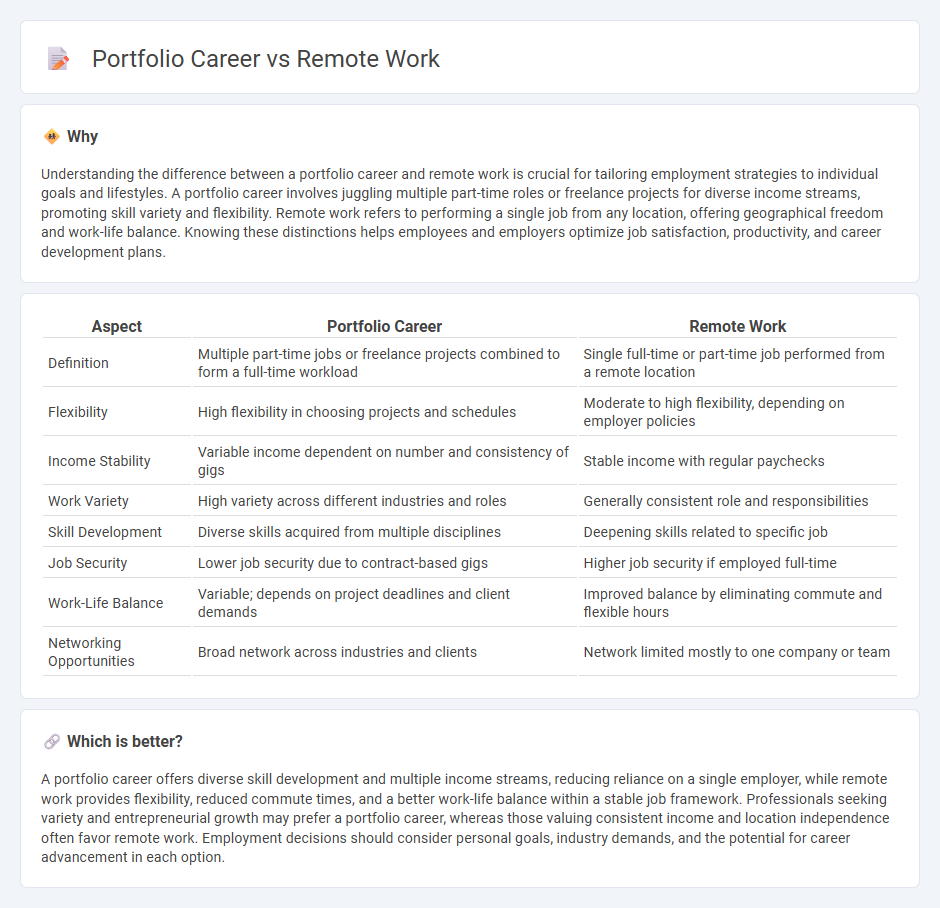
A portfolio career offers professionals the flexibility to engage in diverse projects across multiple industries, enhancing skill development and income streams. Remote work enables employees to perform tasks from any location, leveraging digital communication tools to maintain productivity and work-life balance. Explore the advantages and challenges of each to determine the best fit for your employment goals.
Why it is important
Understanding the difference between a portfolio career and remote work is crucial for tailoring employment strategies to individual goals and lifestyles. A portfolio career involves juggling multiple part-time roles or freelance projects for diverse income streams, promoting skill variety and flexibility. Remote work refers to performing a single job from any location, offering geographical freedom and work-life balance. Knowing these distinctions helps employees and employers optimize job satisfaction, productivity, and career development plans.
Comparison Table
| Aspect | Portfolio Career | Remote Work |
|---|---|---|
| Definition | Multiple part-time jobs or freelance projects combined to form a full-time workload | Single full-time or part-time job performed from a remote location |
| Flexibility | High flexibility in choosing projects and schedules | Moderate to high flexibility, depending on employer policies |
| Income Stability | Variable income dependent on number and consistency of gigs | Stable income with regular paychecks |
| Work Variety | High variety across different industries and roles | Generally consistent role and responsibilities |
| Skill Development | Diverse skills acquired from multiple disciplines | Deepening skills related to specific job |
| Job Security | Lower job security due to contract-based gigs | Higher job security if employed full-time |
| Work-Life Balance | Variable; depends on project deadlines and client demands | Improved balance by eliminating commute and flexible hours |
| Networking Opportunities | Broad network across industries and clients | Network limited mostly to one company or team |
Which is better?
A portfolio career offers diverse skill development and multiple income streams, reducing reliance on a single employer, while remote work provides flexibility, reduced commute times, and a better work-life balance within a stable job framework. Professionals seeking variety and entrepreneurial growth may prefer a portfolio career, whereas those valuing consistent income and location independence often favor remote work. Employment decisions should consider personal goals, industry demands, and the potential for career advancement in each option.
Connection
Portfolio careers, characterized by individuals managing multiple part-time or freelance roles simultaneously, align closely with the rise of remote work by offering flexibility and diverse income streams. Remote work enables professionals to engage with various clients or projects from different locations, facilitating the management of a portfolio career without geographic constraints. This synergy supports a dynamic employment model emphasizing autonomy, varied skill application, and adaptability in the gig economy.
Key Terms
Flexibility
Remote work offers unparalleled flexibility by allowing professionals to perform tasks from any location, breaking free from traditional office hours and commuting constraints. Portfolio careers increase flexibility through diverse income streams and varied projects, enabling individuals to adapt their schedules and skillsets dynamically. Explore further to understand which approach best fits your lifestyle and career goals.
Autonomy
Remote work offers autonomy through flexible location choices, enabling individuals to design their environments for enhanced productivity and work-life balance. Portfolio careers amplify autonomy by allowing professionals to diversify income streams and pursue multiple passions simultaneously, reducing dependence on a single employer. Explore how autonomy thrives differently in remote work and portfolio careers for tailored professional freedom.
Skill diversification
Remote work allows professionals to apply specialized skills across different locations, often within a single job role, while a portfolio career emphasizes skill diversification by combining multiple roles or projects, enhancing adaptability and marketability. Skill diversification in a portfolio career broadens expertise in various fields such as marketing, design, coding, or consulting, offering resilience against job market fluctuations. Explore more insights on optimizing career paths through strategic skill development.
Source and External Links
What Is Remote Work? Ultimate Guide | Wrike - Remote work is a professional environment where employees work from home or any location outside a company's office, enabled by digital tools and reshaping work-life balance and productivity.
What is the definition of remote work? - OPM.gov - Remote work is a flexible arrangement with a written agreement where employees perform work at an alternative site and are not expected to regularly be at the agency's worksite.
Remote Work: Jobs, Companies & Virtual Teams - Remote.co - A platform offering thousands of remote and hybrid jobs with tips from leading remote companies and opportunities across various freelance and corporate roles.
 dowidth.com
dowidth.com